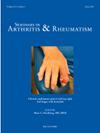Use of biologic drug in the treatment of localized scleroderma and systemic sclerosis in children: A scoping review
IF 4.6
2区 医学
Q1 RHEUMATOLOGY
引用次数: 0
Abstract
Objective
Biologic drugs are a potential treatment option in resistant cases of juvenile scleroderma. In this review, we aimed to examine previous studies regarding biologic drug use in pediatric patients with localized scleroderma and systemic sclerosis.
Methods
We performed a search on MEDLINE and Scopus for articles involving pediatric localized scleroderma and systemic sclerosis patients treated with biologic drugs.
Results
We identified 17 articles describing 58 pediatric patients with localized scleroderma treated with biologic drugs and 12 articles describing 29 pediatric patients with systemic sclerosis treated with biologic drugs during our literature search. The most frequently used biologic drug in localized scleroderma treatment was abatacept (55.2 %), followed by tocilizumab (48.3 %). These biologic drugs were mainly preferred for treating resistant/progressive skin disease in pediatric patients with localized scleroderma (58.5 % and 68.8 %, respectively). The improvement rates associated with abatacept and tocilizumab were 92.9 % and 77.4 %, respectively. Adverse events were observed in 23.5 % of all localized scleroderma patients. The most frequently used biologic drug in systemic sclerosis treatment was rituximab (51.7 %), followed by tocilizumab (44.8 %). Rituximab was predominantly favored for managing cardiac involvement (45.5 %), whereas tocilizumab was preferred for pulmonary involvement (50 %) in pediatric patients with systemic sclerosis. The improvement rates associated with rituximab and tocilizumab were 72.7 % and 94.1 %, respectively. Adverse events were reported in 40 % of all systemic sclerosis patients.
Conclusion
Our results showed that abatacept and tocilizumab were more frequently used in patients with localized scleroderma, while rituximab and tocilizumab were the predominantly used biologics in patients with systemic sclerosis. The improvement rate with these biologics were quite high with acceptable safety profile.

求助全文
约1分钟内获得全文
求助全文
来源期刊
CiteScore
9.20
自引率
4.00%
发文量
176
审稿时长
46 days
期刊介绍:
Seminars in Arthritis and Rheumatism provides access to the highest-quality clinical, therapeutic and translational research about arthritis, rheumatology and musculoskeletal disorders that affect the joints and connective tissue. Each bimonthly issue includes articles giving you the latest diagnostic criteria, consensus statements, systematic reviews and meta-analyses as well as clinical and translational research studies. Read this journal for the latest groundbreaking research and to gain insights from scientists and clinicians on the management and treatment of musculoskeletal and autoimmune rheumatologic diseases. The journal is of interest to rheumatologists, orthopedic surgeons, internal medicine physicians, immunologists and specialists in bone and mineral metabolism.

 求助内容:
求助内容: 应助结果提醒方式:
应助结果提醒方式:


